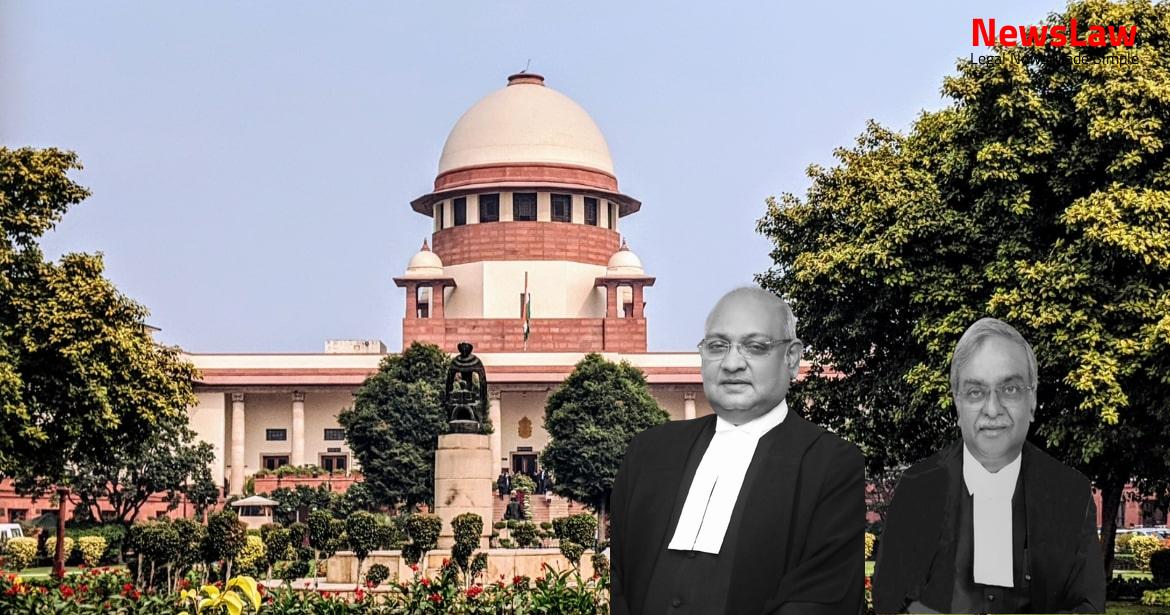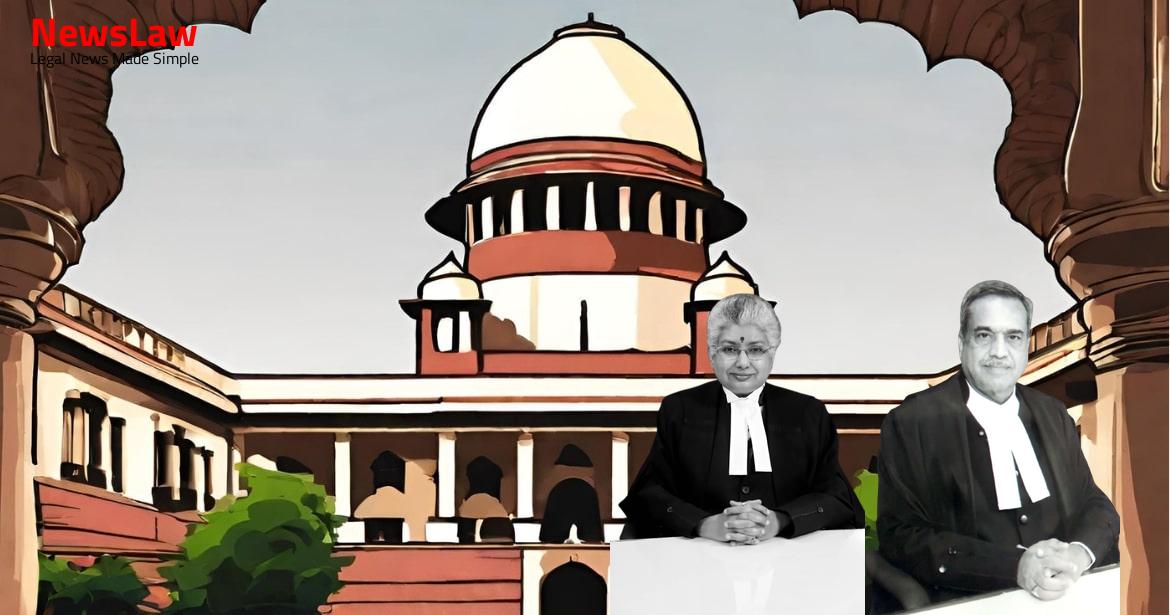In the realm of legal proceedings lies a complex case revolving around property partition. The Court’s meticulous legal analysis dissected the intricacies of claims, upholding some and setting aside others. Let’s delve into the depths of this legal battle and unravel the intricate judgments rendered by the Court.
Facts
- Plaintiffs and defendant No.1 entitled to 1/4 share each in certain properties.
- Legal representatives of deceased parties brought on record.
- Matter regarding specific properties remitted to Trial Court for further proceedings.
- Certain parties impleaded during the pendency of the case.
- Challenges raised against the Trial Court findings on certain properties.
- Appeals filed by plaintiffs partly allowed by the High Court.
- Disputes regarding share in various properties highlighted.
- Amendments to plaint denied by Trial Court.
- Defendants aggrieved against share granted to plaintiffs.
- Various properties and shares mentioned in the proceedings.
- Contentions regarding violation of interim orders discussed.
- Suit filed by plaintiffs for specific share in properties and mesne profits.
- Challenges and appeals filed against Trial Court and High Court decrees.
- References made to past litigations and partition deeds.
- Sale deeds declared null and void in certain instances.
- Remittance of certain matters for further evidence.
- Summary of Legal battles and subsequent appeals filed.
- Schedule-A properties (Regular Survey No(s).50/1, 106/2, 86/2B, 69 & 152/4) were allotted to defendant No.1 in the partition in 1965.
- The High Court disposed of both appeals with a common judgment affirming defendant No.1’s exclusive ownership of the mentioned properties.
Also Read: Legal Analysis in Civil Appeal: A Summary
Arguments
- Appellants argued that the reliance on the 1965 partition in the High Court judgment should render it set aside as it wasn’t part of the initially filed plaint.
- The sale deed executed by appellant-defendant No 7 in violation of an interim order is deemed non-est and should be disregarded.
- Counsel cited cases to support their argument regarding evidence being appreciated beyond pleadings once parties go to trial with knowledge of the issues.
- The property sold by defendant No 7 to defendant No 9 was to protect his interests, as the family members allegedly connived to deny the plaintiffs’ rightful share.
- Despite the High Court ruling the sale as invalid, defendant No 9 didn’t appeal, and only defendant No 7 challenged the decision.
- Learned counsel for defendant No. 9 adopted the arguments raised by learned counsel for the appellants as their interest is common.
- Defendant No. 9 is the bonafide purchaser of the property, a public institution, from defendant No. 7 on payment of consideration.
- In response to the submissions made by learned counsel for respondents No. 1 to 3, learned counsel for the appellant pointed out defendant No. 1’s clear somersault in his stand before the High Court.
- Defendant No. 1’s counsel relied on the proceedings before the Land Tribunal, which was not even pleaded before the Trial Court.
- The sale deed was executed by defendant No. 7 on 25.07.2001, and any error committed by defendant No. 7 was well within the knowledge of defendant No. 1.
- Defendant No. 1 did not challenge the error during his lifetime.
Also Read: Amendment Dispute in Partition Case
Analysis
- The replication filed by the plaintiffs regarding the 1965 partition plea was not considered as the application to amend the pleading was rejected.
- Defendant No. 7 and Defendant No. 2 were allowed to file additional pleadings and present evidence to support their cases.
- The partition deed of 30.08.1984 between Vyasrao Hanamanthrao Desai and Raghavendrarao Hanamanthrao Desai was discussed, indicating agreement on property division.
- The Trial Court rightly disregarded the plaintiffs’ plea on the oral 1965 partition as the amendment had been denied.
- The High Court’s finding that all Schedule ‘A’ properties were allotted to Defendant No. 1 was deemed erroneous.
- The sale conducted by Defendant No. 7 to Defendant No. 9 was considered void as it was in violation of an interim court order.
- The partition in 1984 and subsequent legal proceedings indicated the property shares among the parties.
- Defendant No. 1’s inconsistent stance in the proceedings was noted, leading to support from unexpected quarters.
- The limitations on evidence presentation beyond pleadings were highlighted.
- The Trial Court and subsequent legal actions demonstrated the complex family property disputes and partitions.
- The Court acknowledged the existence of a partition in 1965 without material evidence or affected parties being present.
- No order from the Trial Court extended the interim order to the newly impleaded defendant, ruling out wilful violation.
- The High Court’s order in Writ Petition No 11431 of 1977 was issued before the 1984 partition took place and was filed by a minor defendant through his grandfather.
Also Read: Discrepancy in Property Area Valuation
Decision
- The appeals have been allowed based on the reasons provided.
- The findings of the High Court in relation to Regular Survey Nos. 106/2 and 44/4 have been set aside.
- The Writ Petition was filed against the State to quash an order issued on 21.05.1976 by the Special Land Tribunal in Dharwad.
- The sale deed between the appellant (now deceased) and defendant No. 9 for Survey No. 106/2 has been upheld.
- These properties are deemed to belong to the appellants.
Case Title: SHRINIVAS RAGHAVENDRARAO DESAI (DEAD) BY L.R.S Vs. KUMAR VAMANRAO @ ALOK (2024 INSC 165)
Case Number: C.A. No.-007293-007294 / 2010



